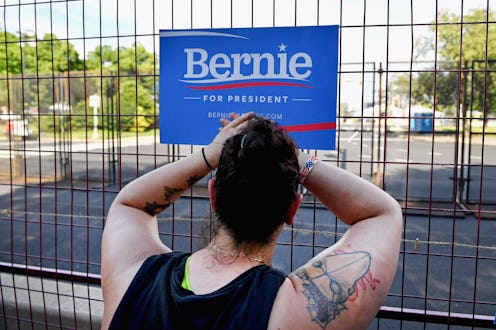News
How Do Third-Party Candidates Compare To Sanders?
As historic as the moment was, for some die-hard supporters of runner-up Sen. Bernie Sanders, Hillary Clinton's acceptance of the Democratic presidential nomination in Philadelphia last week sounded more like the slamming of a door than the shattering of the glass ceiling. While Sanders threw his endorsement behind Clinton, urging party unity in the coming battle against Republican nominee Donald Trump, a faction of his supporters have declared it's "Bernie or Bust" for them. With the general election a little more than three months away, the Sanders supporters unwilling to fall in line with a party that has put Clinton at the helm are turning to candidates outside of the mainstream. So, how do third-party candidates compare to Sanders? Does the senator responsible for igniting a political revolution share more political viewpoints with the Green Party's Jill Stein or the Libertarian Party's Gary Johnson?
It's been a rough few weeks for Sanders supporters, and it's difficult to tell how many of them will ultimately heed the Vermont senator's continued urging to keep the political revolution going within the Democratic Party by casting ballots for Clinton. Although a Pew Research poll released at the start of the Democratic National Convention (DNC) last week claimed 90 percent of Sanders supporters said they'd support Clinton in the general election, a survey from CNN/ORC reported 19 percent of independent voters, a huge segment of Sanders' support base, have decided to vote for third-party candidates now that Sanders was off the ballot. As the dust of the DNC settles, some die-hard loyalists are on the hunt for a presidential candidate with views similar to Sanders, and here's how they stack up.
The Green Party's Jill Stein
Stein, the Green Party nominee, shares several of Sanders' progressive policy ideas. The two both support breaking up big banks, a $15 federal minimum wage, mandatory single-payer health care, tuition-free higher education, increasing taxes on the 1 percent, overturning Citizens United, and enacting campaign finance reform. Both Stein and Sanders are staunch supporters of a woman's right to choose and same-sex marriage. They also share similar positions on many immigration and environmental issues, including pathways to citizenship and prioritizing a transition to green energy sources.
Stein, however, reportedly favors term limits for Congress while Sanders does not. Stein also disagrees with Sanders when it comes to the issue of granting immunity to NSA whistleblower Edward Snowden — she's for it, he's against it. Stein also has a slightly stricter stance on guns compared to the Democratic runner-up. For example, Stein supports allowing victims of gun violence to sue firearm sellers and manufacturers while Sanders does not.
The Libertarian Party's Gary Johnson
Although Johnson appears to share some of Sanders' social views, he is significantly more fiscally conservative than the senator. Both are pro-choice and support same-sex marriage, but Johnson's Libertarian Party affiliation make his views a bit more ambivalent. Traditionally, the Libertarian Party favors state rights, so it's unclear if Johnson would support federal protection of abortion access and LGBTQ rights. Like Sanders, Johnson also supports non-interventionist policies, decreasing military spending, and providing a pathway to citizenship for children of illegal immigrants born in the United States. Johnson also supports increasing immigrants' access to temporary work visas. Both candidates support limiting liability for gun sellers and manufacturers.
Yet Johnson and Sanders disagree on some central issues. Unlike Sanders, who favors tuition-free public colleges and universities, Johnson has said he would eliminate the Department of Education altogether because he does not believe the federal government should play a role in education. Johnson does not support mandatory single-payer health care, a $15 minimum wage (he's against all federal wage regulations), tax hikes on the wealthy, campaign finance reform, or expanding Social Security as Sanders does. Johnson would abolish both income and corporate taxes (along with the IRS), replacing them with one federal consumption tax. Sanders favors raising the corporate income tax. Although Johnson initially aligned with Sanders in rejecting the Trans-Pacific Partnership (TPP) trade deal, he recently changed his stance on the issue and now supports the TPP.
Some of Sanders supporters are toying with the idea of backing a third-party candidate, but the Democratic runner-up has warned against it. "Right now — what is it, three, four months before an election — you're going to end up having a choice," the Washington Post reported Sanders said during a Bloomberg Politics breakfast. "Either Hillary Clinton is going to become president, or Donald Trump." The senator went on to stress his belief that this election was not the time to bank on America's two-party system suddenly being overthrown. "We don't have that. We have and have had [two parties] for a very long period of time — and I know a little bit about this, as the longest-serving independent member of Congress."
